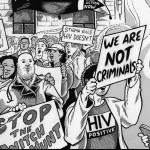UPDATE 8/6/20: Pfizer has informed advocates that its Phase III COVID-19 vaccine trial will include people living with HIV, hepatitis B or hepatitis C.
UPDATE 8/5/20: Moderna, which is developing a COVID-19 vaccine in collaboration with the National Institute of Allergy and Infectious Diseases (NIAID), has agreed to include people with stable HIV in its newly opened Phase III clinical trial, according to advocates. A sign-on letter demanding removal of the exclusion collected more than 1,000 signatures in a week.
Other companies developing COVID-19 vaccines, including Sanofi, NovaVax and J&J, will also include HIV-positive people in their trials, according to longtime advocate Lynda Dee of AIDS Action Baltimore. U.K. advocate Gus Cairns of NAM/aidsmap reports that a Phase III study of a vaccine from the University of Oxford and AstraZeneca will also include people with HIV. That leaves Pfizer, which is jointly developing a vaccine with BioNTech, as a holdout that still may exclude people with HIV or hepatitis B or C. But activists are working to get these exclusions removed as well.
“What an amazing community victory, harkening back to the old days! This was a concerted HIV community effort, once again working with NIAID in the best interests of people with HIV,” Dee told POZ. “Every COVID-19 vaccine company with current trials in the U.S. has agreed to include people with HIV, except Pfizer, which is next on our list.”
Today, we are sharing an important update about our protocol for the Phase 3 COVE Study of mRNA-1273, our vaccine candidate against COVID-19. pic.twitter.com/jigTXUi9v2
— Moderna (@moderna_tx) August 5, 2020
UPDATE 7/31/20: Responding to a question from POZ on an International AIDS Society-USA virtual dialogue on COVID-19 on July 31, Michael Saag, MD, of the University of Alabama at Birmingham, and Robert Schooley, MD, of the University of California San Diego, agreed that there is no reason to exclude HIV-positive people from coronavirus vaccine trials.
“We need to test this broadly,” Schooley said. “If we’re going to be using a vaccine in the general population, you need to test it in the general population.”
“I think trials ought to be open to as many different types of people as possible,” Saag concurred. “The worst case would be to enroll mostly young and middle-aged white people without comorbid conditions. What if it works and you’ve excluded an entire population? What are you going to tell them? We’ve got to have data.”
UPDATE 7/30/20: POZ has learned that Pfizer and BioNTech also plan to exclude people with HIV from their late-stage coronavirus vaccine trial, as well as those with hepatitis B or C.
This article was originally published on July 28, 2020.
As the world waits with baited breath for a safe and effective vaccine to prevent SARS-CoV-2, the new coronavirus that causes COVID-19, people living with HIV are concerned that they may be excluded from clinical trials testing these vaccines.
Following the publication this month of promising data from early-stage trials, two vaccine candidates—one being developed by the National Institute of Allergy and Infectious Diseases (NIAID) and the biotechnology company Moderna, the other by the University of Oxford and AstraZeneca—entered the final stage of testing this week.
But the trial protocol for the NIAID-Moderna vaccine, available on ClinicalTrials.gov (study number NCT04470427), excludes people with an “immunosuppressive or immunodeficient state, including human immunodeficiency virus (HIV) infection.”
“This really stinks! What a great way to begin the U.S. Phase III vaccine effort—let’s exclude people with HIV,” longtime advocate Lynda Dee of AIDS Action Baltimore told POZ. “Apparently, the HIV exclusion was added to a new version of the protocol unbeknownst to many stakeholders. We’re going to do our very best to make Moderna amend the HIV exclusion.”
Dee and a growing group of advocates have issued a sign-on letter to the director of the National Institutes of Health (NIH), which oversees NIAID, demanding that they do not exclude people with HIV. A copy of the letter will be sent to pharmaceutical companies developing COVID-19 vaccines.
In the era of effective antiretroviral therapy, most HIV-positive people on treatment do not have immune suppression because the medications halt viral replication and allow CD4 T-cell counts to return to near-normal levels. Studies so far have found that people living with HIV are neither at greater risk for SARS-CoV-2 infection nor more likely to develop severe COVID-19 or to die from it.
The NIAID-Moderna trial protocol states that it will include “healthy adults or adults with preexisting medical conditions who are in stable condition.” A stable medical condition is defined as “disease not requiring significant change in therapy or hospitalization for worsening disease during the three months before enrollment.”
The Oxford-AstraZeneca trial protocol (study number NCT04400838) excludes people with “any confirmed or suspected immunosuppressive or immunodeficient state” but does not specifically mention HIV. All study sites for this vaccine trial are in the United Kingdom.
While most HIV-positive people on treatment fall into the “stable disease” category, advocates fear that the explicit HIV exclusion criterion in the NIAID-Moderna protocol will create confusion and be interpreted as taking priority.
And in fact, this has already happened. Jeff Taylor of the HIV+Aging Research Project, another longtime advocate, called a local study site listed in the trial description and was told that he could not enroll because he is HIV positive, even though he met all the other study criteria."
“I was shocked to see that HIV was specifically excluded,” Taylor told POZ. "There is no need to exclude the 1.2 million people living with HIV from getting this vaccine—especially since more than half are older than 50 and at increased risk for severe illness or dying from COVID.
“Decades of research have proven that HIV-positive people with undetectable viral loads and a safe CD4 count respond to vaccines, and are encouraged to receive all recommended vaccinations,” he continued. “It should give us pause to see an inexperienced company with a lack of basic scientific knowledge is in charge of a hugely important vaccine trial—at a huge cost to taxpayers.”
Sign-On Letter
According to Dee, Carl Dieffenbach, PhD, director of NIAID’s Division of AIDS, said he would request an amendment to the protocol after the trial opens.
But advocates are in no mood to wait, concerned that HIV-positive people eager to participate in the study will be turned away, as Taylor was, before the amendment makes its way through the system and filters down to local study site coordinators.
In an effort to increase the pressure to change the NIAID-Moderna criteria—and to ensure that other companies developing COVID-19 vaccines do not make the same mistake—advocates issued a sign-on letter to NIH director Francis Collins, MD, PhD.
“We are extremely dismayed to learn that a COVID-19 vaccine candidate developed with significant contributions from researchers at the NIH excludes people with HIV with no scientific basis,” reads the letter. “We want to be sure you are aware of this situation, will do everything in your power to intercede with Moderna to reverse this exclusion and ensure that such an exclusion never happens again.”
“There is no clinical justification for excluding people with HIV from COVID-19 vaccine trials. Thanks to the advent of triple combination antiretroviral therapy in the mid-1990s, HIV infection has not been synonymous with an ’immunodeficient state’ for over two decades,” the letter continues. “At most, CD4 T-cell threshold criteria might be employed if there are concerns about people with very low counts being able to mount insufficient vaccine responses. If there are concerns about a unique immune response for people with HIV, this can be studied through a subset analysis of participants with HIV. This approach should be considered for participants with other controlled comorbidities, and is especially important with respect to communities of color, who are disproportionately affected and suffer disparate outcomes from both HIV and SARS-CoV-2 infections.”
What’s more, the NIAID-Moderna exclusion “sets a terrible precedent, not grounded in any scientific data,” the letter states. “If the Moderna vaccine is approved by the [Food and Drug Administration], there will be no data on its safety or efficacy in people with HIV. Thus, there will probably not be an FDA indication for people with HIV or payer reimbursement as a result.”
“The FDA has been explicitly clear that people living with HIV on sustained treatment should be treated as healthy volunteers for clinical trials,” Ace Robinson of NMAC told POZ. “Furthermore, the racial and ethnic minority communities experiencing the worst HIV-related health outcomes are the exact same ones that are experiencing the worst COVID-19 health outcomes. We must do better to engender trust in these communities. This oversight by Moderna is yet another step backward in establishing medical trust between clinical development and communities of color. Moderna and other biotech firms must be held to the highest standards even when we are moving at warp speed.”
Initial signatories on the letter include some of the big names in HIV advocacy, including Mark Harrington and Richard Jefferys of the Treatment Action Group, Guillermo Chacón of the Latino Commission on AIDS, Moises Agosto of NMAC, Murray Pennerof the Prevention Access Campaign, Mitchell Warren of AVAC and Bruce Richman of the Prevention Access Campaign.
Community members are encouraged to sign on to the letter as well.







3 Comments
3 Comments